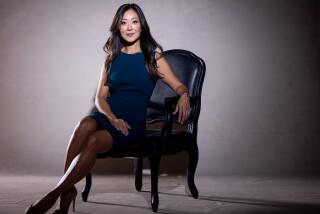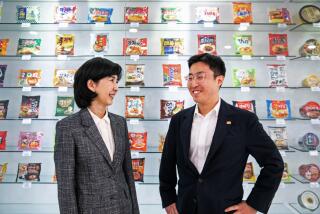PACIFIC RIM TRADE : Profiles : For Asian Tycoons, Success Is a Matter of Seizing Initiative : Whether manufacturing toys or exporting rice, these business leaders have prospered by knowing when to make their moves. : KIM WOO CHOONG, 57, <i> South Korean industrialist</i>
- Share via
You may not know Kim Woo Choong and the Daewoo industrial conglomerate he heads. But you probably know his products: Caterpillar forklifts, sections of Boeing jetliners, Leading Edge computers.
As South Korea’s first major exporter, the globe-trotting entrepreneur built his $34-billion conglomerate on the back of international trade.
From his first venture selling tricot yarn to Singapore after establishing Daewoo in 1967, Kim has expanded his industrial empire to 23 major companies, South Korea’s third-largest conglomerate. He makes refrigerators in China, garments in Myanmar, videocassette recorders in Northern Ireland.
He ships cars to Czechoslovakia and owns a microchip plant in Silicon Valley. He even builds schools in Libya and railway lines in Iran--during the height of the Iran-Iraq War.
“I can smell money everywhere,” says Kim, 57, in his best-selling biography.
That hunger and drive was shaped by the hardships of the Korean War, Kim says.
At age 14, he was left to fend for his mother and two siblings when his father was seized by North Korean soldiers. In his hometown of Taegu, he hustled for money selling newspapers, racing to push them into the hands of people and backtrack later to collect the money. He outsold his rivals 10 to 1.
A graduate in economics from Yonsei University, Kim started Daewoo (Great Universe) as a trading firm with five employees and $10,000. He started with textiles and got a big break when he gambled on a new type of rayon developed by Mitsubishi of Japan. He guessed that shirts made from the fabric would be a hit in the United States. They were. He earned $6 million in three years.
One of his most celebrated coups came in 1976, when he revived a state-owned heavy machinery plant at the request of then-President Park Chung Hee. The plant had been losing money for 37 years. Kim turned it around in nine months by slashing costs, building employee housing to boost morale and driving up productivity.
He worked a similar miracle with state-owned Okpo shipyard, which he was asked to take over in 1978 and which finally turned a profit in the last two years. The feat earned him the nickname Midas.
Now Kim has his sights set on Daewoo’s auto business. He declared this year that his “last duty” to the group will be to make Daewoo Motors one of the world’s top 10 auto makers.
His detractors view him as somewhat reckless, driven by a blind desire for nearly any business opportunity.
He admitted that his life is not balanced; he’s never played golf or attended a concert or theater show in his life. He spends more than 200 days abroad and has never taken a vacation except the morning of his daughter’s wedding.
Even today, he prowls the floor of Daewoo Motors most nights looking for defects.
More to Read
Inside the business of entertainment
The Wide Shot brings you news, analysis and insights on everything from streaming wars to production — and what it all means for the future.
You may occasionally receive promotional content from the Los Angeles Times.











